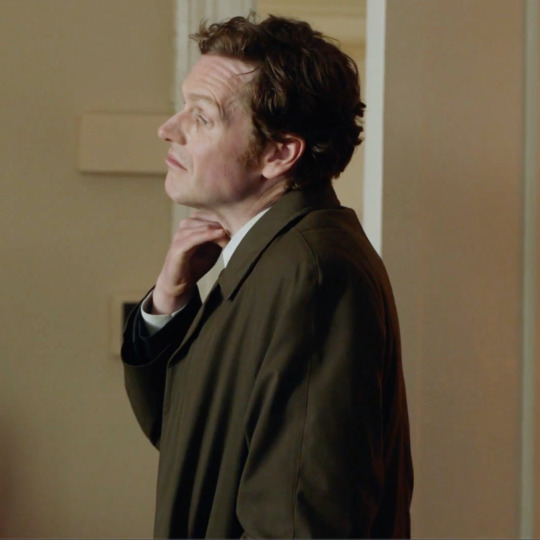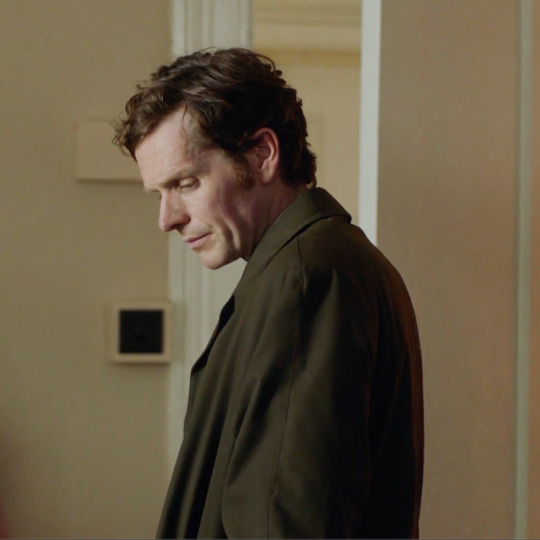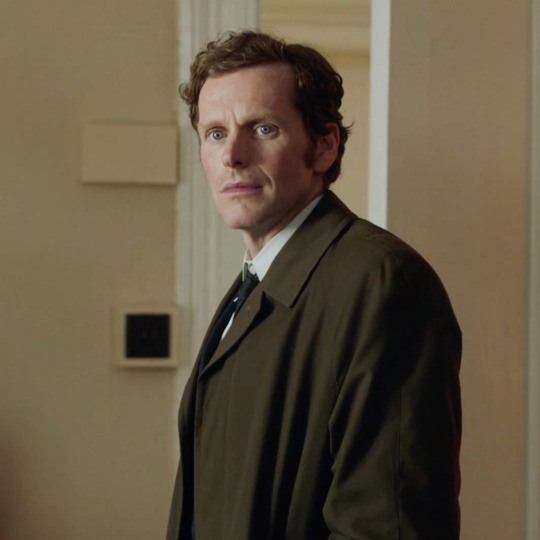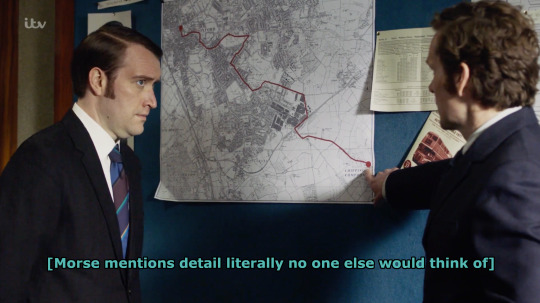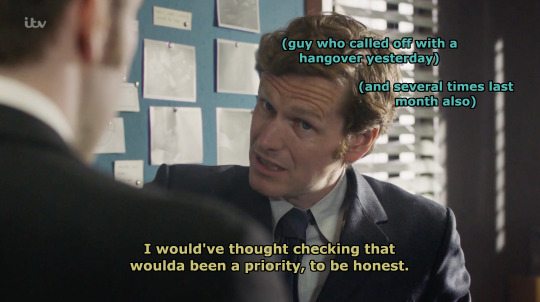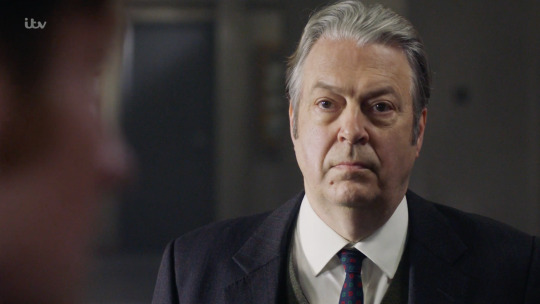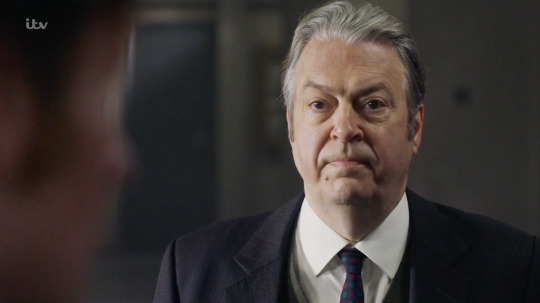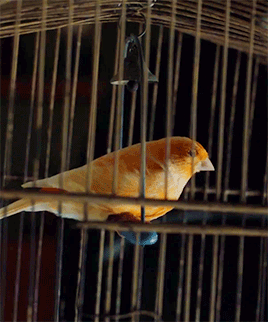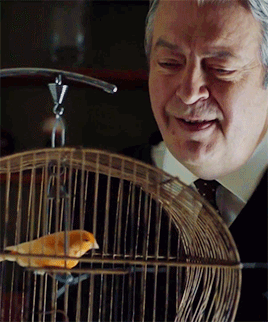just a boy from the sticks with a chip on his shoulder and a library card ; bal's endeavour sideblog
Don't wanna be here? Send us removal request.
Text
thinking about claudine from s5 of endeavour and how i hear hate for her.
she was very very clear about the boundaries of their relationship and she wanted to bone down and she GOT IT. as far as i'm concerned she dodged a BULLET, especially how he acted about her leaving when she CLEARLY DEFINED THEIR BOUNDARIES. And i believe her exact quote is 'it's not love' -- 'it's good to be clear'.
so like yall hate women actually huh?
#imo she read the warning signs very accurately#whenever i see people hate her they always neatly skip over the fact she shared her dream about her photography#and he basically dismissed/insulted it#*that* is the context in which she left him with just the photo
38 notes
·
View notes
Text
“weird and unhealthy relationship that cant be categorized neatly as sexual or romantic or platonic but has a defining air of devotion and obsession to it” wins sound of the summer for the 13th year in a row
37K notes
·
View notes
Text
That Thing You Didn’t Talk About, Let Alone Do Back Then #237: Divorce
It seems like quite a few of us have recently rewatched Degüello and it hit each of us in different ways. I was particularly struck by this scene between Thursday and Win where she tells him she’s finally gone so far as to see a solicitor about a divorce….
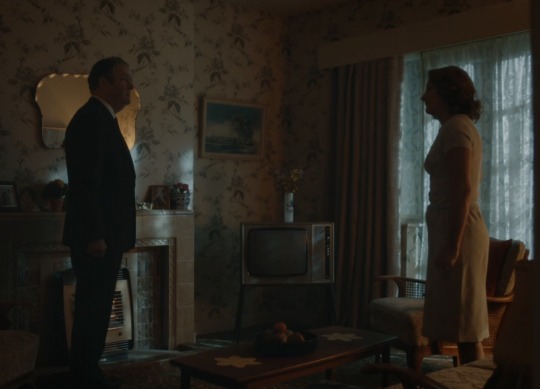
Of course the divorce never happens and the Thursdays’ marriage makes it all the way through Series 9 and hopefully beyond. It’s easy, though, for people today to underestimate what a huge deal this would have been in the early 70’s. It was a time when divorce was still firmly in the category of “disreputable” in a way that I think is hard to understand for those who didn’t live through that era or who haven’t been exposed to a lot of period media. I’ve had a number of conversations with people who equate it with divorce today and just don’t seem to grasp how shameful and isolating it could be only a few decades back.
That goes doubly so for the 1940’s or 50’s when Morse’s parents would have been divorced. In one of his interviews with D.M. Barcroft, Russ Lewis says of Morse’s parents’ divorce:
“But then – and I can only speak to the early 60s and 70s – so one must multiply that by an order of magnitude for the 40s/early 50s when Cyril and Endeavour’s mum went their separate ways – the social stigma then around divorce was unimaginable. For Endeavour, it would have been whispers in the playground – looks and nods in the street. A certain pursed-lips reserve in the butchers when he went shopping with his mother – as if people feared contagion. Divorce. Unmarried pregnancy. Two sides of the same coin. The fear of being found wanting and becoming an outcast from the tribe. People moved away. They left one part of the country for another to escape the disapproval and stigma.”
Today in Europe and the U.S. divorce is mostly seen as an unfortunate but necessary option. It’s the choice you make when a marriage is irrevocably damaged. That attitude while common, however, is so very recent. Definitely in the 1970s and even well into the 80s, it’s not an overstatement to say that divorce was often a literally terrifying prospect for people. Why?
Religious:
Marriage is sacred: It was still the subject of strong religious taboos in many places. Marriage had long been seen as a sacrament—an agreement not just between you and your partner but with God as well. There were no take-backs, no do-overs. Divorce wasn’t just ending a broken relationship. It was selfishly putting your own personal desires above a sacred vow to God.
Because marriage is always good, you must be bad: And in a moral catch-22—because marriage was just always so sacred and good—whatever unsolvable problem you were dealing with must really be because of you. It must be because you…lusted after someone else…Because you couldn’t be a good enough wife to keep your husband’s eyes from roaming…Because you weren’t a patient enough husband to “put up” with your wife’s constant abuse... Somehow, it had to be your fault.
Cultural:
Divorce is always selfish: Culturally, divorce was often regarded not with compassion but with contempt. It was seen as a fundamentally self-centered act. And that’s without even getting into the issue of “the children.”
The Children: At the time, children were pretty much always regarded as irreparably emotionally damaged by divorce and sometimes even seen as tainted morally by their parents’ actions. This was seen as outweighing any damage caused by parents in an abusive or toxic marriage.
Legal:
Advent of no-fault: While the social stigma of divorce to a certain degree stemmed from the religious stigma (divorced people were seen as somewhat wicked for the “sin” of divorce), much of the taint stemmed from the process itself. There was no such thing as completely “no fault” divorce until remarkably recently. From my quick-and-dirty research: The first U.S. state to have no-fault was California in 1970. New York became the last state in 2010. The UK started to allow no-fault (but only after 2-5 year periods of separation) in 1969 but only waived extended waiting periods in 2020.
Prior to no-fault: Prior to no-fault, however, divorce essentially meant that at least one spouse had to accuse the other of an offense (a “fault”). The acceptable list of offenses in most western countries included a grab-bag of morally-loaded “grounds” such as desertion, cruelty, insanity, adultery, homosexuality, drunkenness, etc.
Public declaration: Typically the parties involved were required by law to proclaim their accusations in a very public manner—often both in court and via publication of the information as a legal notice in local newspapers. And finally, for the divorce to “go through,” someone had to essentially be found guilty of said offense.
Social:
Everybody knows: In practical terms, this meant that your neighbors—or the parents of your children’s friends—or your boss—all of them knew that your husband had left you for someone else or that your wife had a drinking problem or whatever else you or your spouse had decided to tell the court.
An example: My grandmother’s parents divorced in the 1940s in the U.S.—an era where divorce was very rare. It was highly traumatic for my grandmother—especially when the local newspaper had to publish the legal notice and mixed up which spouse had “deserted” the other. She and her mother were no longer seen as acceptable company for many of their neighbors. Many of the parents of my grandmother’s friends would no longer allow their children to associate with her. She lived well into her 90s and even then would still occasionally talk about the experience.
Economic:
Many women had no money or skills: None of that even begins to touch on what the economic implications of divorce used to be. These were usually couples where the wife had either never been employed or had only been employed briefly before marriage. She would rarely have marketable skills and even if she did, any options for childcare while she worked would be limited—unless she had family or friends willing to pitch in for free. Divorce—especially prior to the 1980s—almost always meant a life of struggle—if not a life in out and out poverty—for the women and children involved.
There is of course more, but I’ll stop there. Needless to say, Win and Fred divorcing would have been a very big deal. Morse’s parents divorcing when he was a child would have been a very, very big deal.
I always though it was unfortunate that the only time they really touched on the topic of divorce with Morse was in Scherzo—and then in a fairly superficial way. It would have been a hugely significant part of his childhood and a major influence on the man he became.
42 notes
·
View notes
Text
something so crazy-making about unhealthy mentor-protegé relationships. we're foils, we're mirrors, we're the same person, we're a parent and a child, we're lovers, we're enemies, we'd be better off without each other, we'd kill and die for each other
21K notes
·
View notes
Text
Morse and loneliness
Morse always sees himself as alone - perpetually lonely with no one to love him, nor even close friends. And while the younger Morse played by Shaun Evan’s certainly channels this, it is particularly pronounced about how John Thaw plays the older, more cynical Morse in IM. But is it really the truth?
The romantic love might have eluded him, but friendship? At a conservative estimate, he had Fred Thursday (in spirit if not in person post-Exeunt), Peter Jakes, Jim Strange, and Robbie Lewis as lifelong friends who would willingly lay down their lives for him (as he would for them). And it would probably be entirely fair to add Bright and McNutt to that count.
The more I watch Endeavour and IM, the more I feel that the only thing Morse actually struggled with was being a good boss. When he has to take Fancy under his wing in Endeavour, he is obviously completely unprepared for that role. And in IM, we really don’t get a feel for what sort of boss he would have been to a beginner because Lewis (already an experienced DS and a happily married man with kids he is devoted to when their paths first cross) is streets ahead of him from the get go when it comes to emotional maturity and balance.
#i lost the energy to wrangle my video editor#but i dearly wanted to take the voiceover from s7 re: this is a story about love#and put it over the ending montage of the characters in exeunt ;_;#but anymore more to the meat of this idea:#I think it's not that morse didn't have the companions/friends/love#so much as something within him personality or trauma or otherwise#forever felt that precious bit estranged from fully embracing those loves#and i'm always interested in thinking about why that is
51 notes
·
View notes
Text
Essential Morse-verse Poll!
24 notes
·
View notes
Text




Her Royal Highness put everyone quite at their ease. A marvellous quality, don't you think? She spoke to you then, Sir?
152 notes
·
View notes
Text
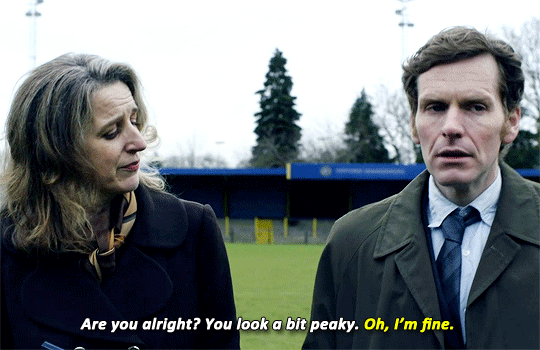
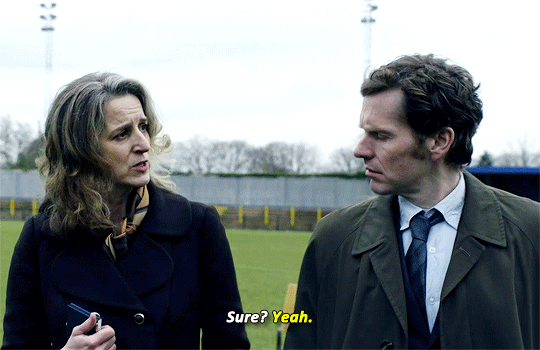
ENDEAVOUR | STRIKER.
100 notes
·
View notes
Photo





Joan leaves and says goodbye to Morse ⇒ Series 4. Episode “Harvest”
211 notes
·
View notes
Photo






Not back off light duties five minutes and already it’s foul play. Just like old times.
189 notes
·
View notes
Text
Morse wondered if Thursday would cross the line. If he would push him up against the door and kiss him, right there, in his suburban neighbourhood family house. Right there, in front of the memories of his wife and children, growing up, growing older, with a packet of sandwiches made by his wife in his pocket. Morse dearly hoped Thursday wouldn’t. He desperately hoped he would.
“Thank you,” He managed. “If Mrs. Thursday can spare you?”
Thursday’s eyes flickered, and he shifted back. Morse could still smell his aftershave. It was the same brand he’d been using for years. “I’m sure she will.”
*
Post season 6, Morse and Thursday resume an affair.
--
Dedicated to @terribleoldwhitemen ❤️
13 notes
·
View notes












